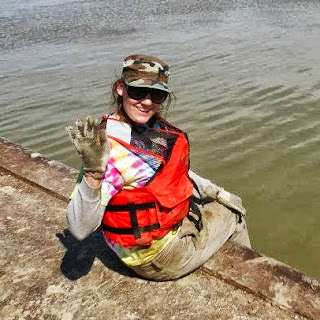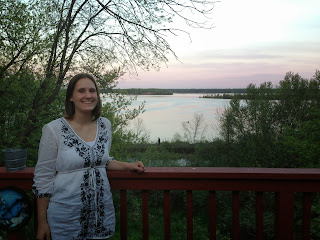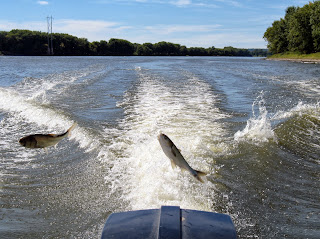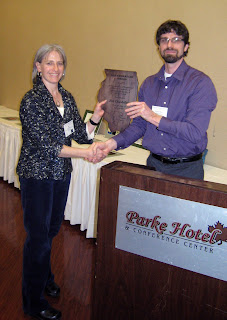Among the projects selected for their ability to restore, protect, and maintain the beauty of the Lake Michigan shoreline, Illinois-Indiana Sea Grant’s “AIS Outreach to Coastal Constituents” project was chosen for its ability to positively impact the Lake. The project, which seeks to continue spreading information and education about invasive species and their dangers to the Great Lakes, will help consumers, businesses, and residents better understand the dangers of invasive species and the simple steps that can prevent their introduction or spread.
Category:
AIS project awarded inaugural ICMP grant
October 25th, 2013 by Irene MilesIntern Allison spends some of her summer internship on-board a research vessel
October 22nd, 2013 by Irene Miles
“As an indecisive, undeclared sophomore I enrolled in a course titled Environmental Sustainability. Though I registered with low expectations, I found myself completely captivated by the readings and discussions we had in class. By the end of the semester I knew environmental sustainability was a passion I wanted to pursue, and I declared a major in Earth, Society, and the Environment. I also added a Geography and GIS Major and Business Minor along the way. Studying and working in these fields has afforded me the opportunity to engage in a wide range of academic and extracurricular experiences that have truly shaped my outlook on the world and secured my commitment to responsibly addressing environmental issues.
My internship with the Illinois-Indiana Sea Grant this summer has been the most rewarding experience of my collegiate career thus far. As the Great Lakes Education Intern I worked under the leadership of my mentor Kristin TePas to develop a website for the U.S. EPA research vessel Lake Guardian that effectively communicates the ship’s research and educational activities to the general public. The Lake Guardian is a unique and extremely valuable resource that has facilitated Great Lakes research for over 25 years, which in turn promotes better understanding and awareness of environmental issues affecting the lakes.
Kristin and I, through the creation of a user friendly Lake Guardian website, hope to expose teachers, students, and the general public to current Great Lakes research projects and inspire communication between scientists and their communities. By interviewing our target audience we determined what people wanted to see on the website and then developed some of the items they requested, including a ship specifications chart, science equipment videos, an ‘Ask a Scientist’ form, FAQ page, Science and Marine Career videos, as well as a YouTube channel and Flickr gallery to give a sense of life and work on the ship. The overarching goal is for the Lake Guardian site to be a fun and engaging way to compel people to be invested in the health and vitality of the Great Lakes.
My experiences this summer have opened my eyes to the importance of protecting the Great Lakes, which had not previously been in the forefront of my environmental concerns. Even growing up in Chicago I took Lake Michigan for granted because I did not understand how fragile the Great Lakes ecosystem truly is, or how critical the Lakes are to people’s livelihoods. Increasing awareness is vital to conserving the Great Lakes, and my position with Illinois-Indiana Sea Grant this summer gave me great exposure to environmental outreach. I have thoroughly enjoyed my work, especially all the valuable input I received from an assortment of teachers, scientists, Lake Guardian crew, and Sea Grant staff. This internship has been an excellent growing experience for me. I have vastly improved my communication, planning, and organizing skills as well as enhanced my understanding of the Great Lakes.”
Allison is one of four interns who worked with IISG this summer.
Recent grad gets hands-on experience with social science through IISG summer internship
October 18th, 2013 by Irene Miles“This summer I interned with Illinois-Indiana Sea Grant as the Human Dimensions of Natural Resources Intern. When I found the listing for the IISG Internship position I knew right away it was right for me. I was ecstatic to find a position that aligned with my interests in both psychology and environmental science, so I excitedly submitted my application and then waited nervously. Days after I walked across the stage as a 2013 graduate from Northern Illinois University, I relocated from DeKalb, Illinois to my new office on the University of Illinois’ campus.
Throughout the summer I traveled around the Great Lakes with my mentor Caitie McCoy and collected data on people’s perceptions of contaminated sediments. One of Sea Grant’s missions is to conduct research across the Great Lakes; as such, my job was to assist Caitie in conducting a study on two contaminated rivers slated for cleanup. In order to restore the health of the Great Lakes ecosystem and restore benefits to the local communities, the GLLA funds sediment remediation and habitat restoration in connecting waterways. The purpose of our research was to gain an understanding of how people in these communities relate to their river so that this information could be used to guide outreach efforts at these and other contaminated sites. We were also interested in the different benefits that communities receive from these waterways and how cleanup efforts might enhance those resources. In order to get a site-specific understanding we traveled to different locations and interviewed local leaders.After learning about the background and purpose of the GLLA program, my first task was to recruit interview participants. I am rather shy normally, but conducting the recruitment communications and helping with the interviews was a great experience to break me out of my shell. I was pretty nervous during my first recruitment call, but after speaking with an extremely nice and generous person who invited us to go fishing during our interview I became much more comfortable. With help from our local outreach teams, we ended up with nearly 45 interviewees between our two sites (Duluth, MN and Sheboygan, WI).I really love to travel, see new places, and learn new things so I have to say conducting the interviews was my favorite part of the internship. Both cities were beautiful in their unique way, and I’d definitely visit again if I got the chance. (In fact I’d consider living in Duluth despite an average of 80 inches of snowfall per year.) It was so interesting to get to listen to people’s stories and learn about the environmental issues in the Midwest. After the site visit I got right to work at transcribing the interviews which I will admit was not my favorite part of the experience but was a very valuable task and an opportunity to develop a new skill.Before this internship most of the research I had been involved in was quantitative so the idea of data analysis guided by intuition was sort of foreign to me. At first I stumbled through the process but I found conceptual ground and eventually was able to enjoy qualitative analysis. Because of my concern for the health of the environment and my interest in social science it really gives me a great feeling to know that research like this is being conducted. In the end I feel accomplished; the study I helped with this summer will guide future outreach at the sites we visited and add to our understanding of the benefits of river cleanups. And ultimately that will help prove the real-world value and impact of programs like GLLA. This internship reaffirmed my passion for research and exposed me to a multitude of career options that are directly in line with my interests. I leave this position with a little more direction and a lot more hope for the future of the Great Lakes.”
Great Lakes Awareness Day at Shedd Aquarium demonstrates the importance of the Lakes
October 16th, 2013 by Irene Miles
“To put it bluntly, Great Lakes Awareness Day was a huge success. There was maybe only a moment or two during the 3-hour event that exhibits weren’t crowded with people ready to learn more about aquatic invasive species, habitat restoration, and pollution from unwanted medications and unnecessary lawn care products. In the back-lit glow of the aquarium’s Water of the World galleries, children and adults became detectives on the hunt for aquatic invaders, saw how pollutants from streets and lawns flow into waterways with the help of a three-dimensional model, tested their knowledge of pharmaceutical pollution, and drew pictures of plants and animals important to Great Lakes health. Perhaps the biggest hit of the day was Spin-Fish-Win, an aquatic invasive species (AIS) trivia game.
No matter what part of the event they joined in on, though, these Shedd visitors were clearly interested in talking about important Great Lakes issues–sharing what they know and asking questions about what they didn’t. People I talked with were particularly interested in learning more about Asian carp, asking questions like “what makes them so bad,” “what can we do to stop their spread,” and even “can’t we just eat them?” Visitors were also surprised to learn about the impact pharmaceuticals have on fish and other aquatic organisms and wanted to know how they could safely rid their cabinets of unwanted medicines. And a father and his son took advantage of an AIS art contest to clear up rumors they had heard about some invaders and get up to date on the newest species knocking on the Great Lakes’ door.
Joining IISG staffers at the event were teachers and students from area schools who came to share what they are doing in their communities to protect water quality and aquatic wildlife. LaToyia Gilbert and her students talked about bringing medicine disposal ‘dos and don’ts’ to citizens and pharmacy technicians in Gary, IN.
Latoyia was inspired to create this project based on what she learned at the recent Great Lakes B-WET workshop. Jim Doyiakos and students from Amundsen High School introduced visitors to the risks of invasive species. And Ronald Hall’s 41st Street Beach Eco Warriors from Evergreen Academy Middle School shared their experiences picking up trash and monitoring water quality at Chicago’s 41st Street Beach.Thanks to a Shedd Aquarium teacher workshop going on that same day, some of the people who stopped by the exhibits were also teachers looking for ways to bring Great Lakes science into their classrooms. Many of these teachers took pictures of the displays or copies of the handouts so they could replicate the activities later. Others sought advice from teachers manning exhibits about potential stewardship projects they could do with their students. One teacher who helped with the event even asked if it could be repeated in the spring so her students could present their own projects.”
Summer intern works on getting the word out about waste reduction
October 10th, 2013 by Irene MilesJohn Saltanovitz, currently a senior at Purdue earning a bachelor’s degree in Natural Resources and Environmental Science, worked this past summer as a sustainable communities outreach intern with IISG’s Kara Salazar. He wrote in to detail his experience getting hands-on in the environmental science field.
“When I started college, I was not aiming towards a career in environmental science. But as my classes progressed and I learned more about the topics, I realized how important the field was. There are so many issues that, if left ignored, could cause problems for future generations. Working to solve these problems is why I chose environmental science as my major. I learned about the internship with IISG from an email my department sent out, and it seemed like an amazing opportunity to get hands-on with the field I wanted to be involved in.
My specific focus was with community outreach. I worked with Kara on creating publications that could help communities be more aware of environmental problems and how to fix them. My main project was creating a zero waste guide that could be used for planning local events in the future. The guide helps to provide ideas and statistics behind zero waste events, how they work, and how to plan for them. My hope is that this document will encourage people in the community to work towards being more environmentally friendly.My work this summer has showed me how much effort those in the outreach field put forth to help make a difference. I’ve always grown up around the Great Lakes, but this internship really opened my eyes to all of the different projects people are doing to assist and protect the Great Lakes region. Before this internship, the idea of research/outreach with the Great Lakes hadn’t crossed my mind, but this summer’s experiences have greatly increased my interest in and passion for the subject. I’ve learned that no problem is too small or unimportant when it comes to creating a better place to live and a healthier environment.I plan on continuing my studies in environmental science and working towards a degree in environmental engineering. My internship showed me how many possibilities are out there and what can be accomplished with hard work. I’ve met so many great people through IISG who all have a passion for what they do. It was a blessing to be involved in an organization like IISG. The only downside is that the summer felt like it went by so fast. I wish that I could have had more time to continue working and networking in the field.”
Sea Grant intern gets the word out about invasive species this summer
October 3rd, 2013 by Irene Miles“I’ve always had a love for being outdoors. Several family members of mine work in the environmental field, so that helped spark my interest in biology and environmental science. A relative of mine mentioned the IISG internship program to me last summer, but I was away at school and unavailable. I was very thankful that this internship was offered again this year as I finally got the chance to get involved with Sea Grant.
I worked with the Aquatic Invasive Species Outreach Team in Glencoe, IL. Specifically I worked with fishing tournament anglers and organizers, helping that group prevent the spread of aquatic invasive species. Anglers are a large and crucial audience when trying to reach recreational water users, as they are dependent on healthy water for fishing. However, little information was available on this audience and what they do in terms of AIS prevention. I conducted a survey with tournament organizers to better understand what their role was in AIS prevention, and I attended several fishing tournaments throughout the summer to conduct public outreach.
I’ve gained so much more experience with public outreach and education through this internship. Going to events throughout the summer has provided me with experience explaining complex environmental issues to the public. I’ve always had an interest in ecology, but this internship has really fueled an interest in aquatic ecology, especially in the Great Lakes region. The Great Lakes are an important natural resource for us, and my internship gave me an opportunity to help protect the Lakes in a meaningful way.
At this point, I want to continue working in the environmental field before going back to school for any graduate work. At the moment, I’ve just been hired to continue with IISG as an outreach assistant. I’m obviously extremely excited to stay on board with the AIS team and continue working with recreational water users as well as other audiences critical to preventing the spread of these species.”
IISG summer intern helping spread AIS info to tournament fishers
June 27th, 2013 by Irene Miles“It has been a busy week for me at the AIS office. This summer I am primarily working with fishing tournament organizers and anglers to better understand their attitudes and practices in AIS prevention. Last weekend, I attended my first fishing tournament and had a great time. Although the weather was less than ideal at North Point Marina, Clean Boats Crew and I were able to reach out to the salmon and trout anglers in the Geoffrey Morris Memorial Tournament. Sarah and I attended the rules meeting Friday evening to talk about simple steps tournament anglers can take to prevent the spread of AIS. Then on Saturday I went to the weigh-in to speak with anglers one-on-one and hand out educational material. There were around 70 boats participating in the tournament, with multiple anglers per boat. The audience was receptive and I really enjoyed speaking with them about the importance of AIS prevention. I’ll be attending another tournament in Indiana next weekend, and I’m hoping for nice weather and lots of fish so I can reach as many anglers as possible! Overall I’m really enjoying working with this audience over the summer as I’m getting lots of experience with outreach.”
IISG AIS coordinator receives Lake Guardian award
April 18th, 2013 by Irene MilesThe Lake Guardian award, given annually, acknowledges each winner’s career-long efforts to ensure healthy lakes throughout the state of Illinois, and this year Illinois-Indiana Sea Grant’s Pat Charlebois was selected from among several nominees.
IISG brings important aquative invasive species info to high school fishing tournament
April 10th, 2013 by Irene MilesWhile parents, coaches, and friends gathered around to watch high school anglers show off their catch from a fishing tournament held early this week, IISG’s Sarah Zack was onsite to introduce competitors and on-lookers to simple practices that can prevent the spread of aquatic invasive species (AIS). Hosted by the Illini Bass Fishing Club, the event brought high school clubs from across Illinois to Clinton Lake on April 7 to see who could catch the most and the biggest bass. The tournament, one of few held at the high school level each year, gave IISG’s AIS outreach team an important opportunity to talk with young anglers about the threat of AIS to local waterways.
During the few hours that IISG was onsite at Clinton Lake, Sarah talked with dozens of anglers and boaters from across Illinois. Frequent announcements from the tournament emcee also reminded the audience of the negative impacts AIS can have on the health of aquatic environments. Many of the people who visited the IISG booth had heard about Asian carp. But fewer people knew about the need to remove, drain, and dry all equipment after a day on the water. Most were also interested in learning about a new Illinois law that makes it illegal to drive with plants or mud still clinging to boats and trailers.
“These anglers want to make sure they’re doing their part to prevent the spread of AIS because they know that is an important part of preserving the sport of fishing for the future,” said Sarah. “It is encouraging that the message is being embraced. I was especially excited to work with the Illini Bass Fishing Club because of their commitment to AIS prevention.”
“We started this because we wanted to show kids in high school that if they care about fishing enough, and work hard enough, they can take it somewhere,” said Luke Stoner, executive administrator for the club. “What we really like to see are smiling faces and big old bass.”
This year, 134 students fought to catch the most and biggest fish. For many of the teams, the tournament marked their first day on the water this season. But after months of casting practice and learning how to “flip and pitch” the lure to trick the bass into biting, the student anglers were prepared.
Three teams brought in bags of fish weighing more than 17 lbs, and three fish came in at over 6 lbs. Their successes at this event will help students qualify to compete in sectional and state competitions slated for later this year.
Recent News
- Aquatic Invasive Species Specialist Greg Hitzroth wins ILMA Lake Guardian Award
- Cooperative Lake Michigan research effort focused on critical management issues and knowledge gaps
- IISG announces intern opportunites with Shedd Aquarium, National Park Service, and Chicago Wilderness
- IISG finds new approaches to help communities and others make informed decisions
- New research predicts potential flooding impacts on critical infrastructure
IISG Tweets
Categories
- Aquaculture
- Aquatic Invasive Species
- Buoys
- Climate Ready Communities
- Director's Blog
- Education
- Featured
- Fellowships
- Fisheries
- Funded Research
- Funding
- Great Lakes Cleanup
- Great Lakes Data
- Healthy Waters
- Internships
- Jobs
- K-12 Education
- News
- Photos
- Program
- Recreation & Tourism
- Resources
- Sea Grant Scholars
- Stormwater & Green Infrastructure
- Sustainable Community Planning
- The Helm
- Uncategorized
- Video
- Water Supply









